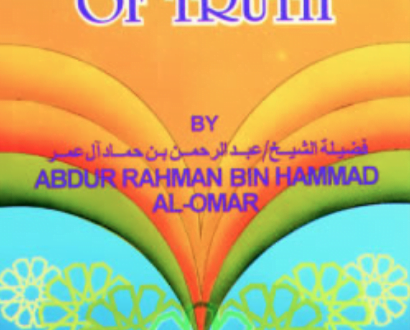At-Tawhid (Worshipping Allah in Islamic Monotheism)
At-Taw’hid means worshipping Allah in Islamic Monotheism. It is the first and most important basis of Islam and the reason behind Allah sending His Messengers to mankind. Allah said, what translated means, {And verily, We have sent among every Ummah (community, nation) a Messenger (proclaiming), “Worship Allah (Alone), and avoid (or keep away from) Taghut (all false deities, etc. i.e. do not worship Taghut besides Allah).”} [16:36].
At-Taw’hid does not only mean what many people nowadays think it means, that there is no Creator except Allah. Rather, what the Salafi knows and understands from At-Taw’hid is truly larger in scope and importance. When a person disregards any part of these aspects of Taw’hid, he or she will be committing Shirk in Allah, or will be falling into heresy with regards to Allah’s Names. Many Muslims are unaware of several of these aspects of Taw’hid, hence falling into Shirk, all the while thinking that they are practicing Taw’hid. The fact is that such people either commit heresy with regards to Allah’s Names and Attributes, believing in them in an incorrect manner, or they are worshipping others besides Allah.
Parts of At-Taw’hid
Muslims are obliged to acquire the correct Faith that Allah has sent Prophet Mohammad and the rest of the Prophets and Messengers with. This is the Taw’hid that will save one from eternal punishment in Hellfire. It is also the only path to Paradise. It is the only true Taw’hid that is the opposite of Kufr and Shirk. The Salafi Da’wah is concerned with calling people unto the correct Taw’hid that they need to embrace, so that they enter Paradise, by Allah’s Leave.
The scholars of Islam, such as Imam ibn Taymiyyah, have stated that At-Taw’hid is divided into three categories: Taw’hid Ar-Rububiyyah, Taw’hid Al-Uluhiyyah, and Taw’hid Al-Asmaa’ wa As-Sifat, which mean Allah’s Names and Attributes. These parts which the scholars have stated are just scientific terms that they use to explain the various aspects of Taw’hid. The proofs to each part are truly in abundance in the Quran and Sunnah.
At-Taw’hid is the first and most important basis of Islam and the reason behind Allah sending His Messengers to mankind.
Taw’hid Ar-Rububiyyah
This part of Taw’hid entails believing that Allah is the Creator, the Sustainer, Who gives life and Who brings death, and Who controls the affairs of the heavens and earth. Believing in this part of Taw’hid is well-entrenched in the hearts of the slaves, and very few people deny it. Even the disbelievers to whom Prophet Mohammad was sent did not dispute this aspect of Taw’hid. Allah mentioned this fact in the Quran, when He said, what translated means, {Say (O Mohammad), “Who provides for you from the sky and from the earth? Or who owns hearing and sight? And who brings out the living from the dead and brings out the dead from the living? And who disposes the affairs?” They will say, “Allah.” Say, “Will you not then be afraid of Allah’s Punishment (for setting up rivals in worship with Allah)?”} [10:31].
Only a minority of people throughout history have denied this aspect of Taw’hid, although deep in their hearts they still believed that Allah is the Creator of the universe. This type of people includes Ad-Dahriyyah sect in the past and the atheists in modern times. Their numbers are meager when compared with the majority of mankind who do believe in Ar-Rububiyyah. The Dahriyyah’s and the atheists’ denial of Allah’s Lordship is a result of their arrogance and their rejecting the truth, just as Mosses described Pharaoh, as was mentioned in the Quran, {“Verily, you know that these signs have been sent down by none but the Lord of the heavens and the earth as clear (evidences, i.e. proofs of Allah’s Oneness and His Omnipotence).”} [17:102]. Also, Allah said, {And they belied them (those Ayat) wrongfully and arrogantly, though their ownselves were convinced thereof (i.e. those Ayat are from Allah, and Mosses is the Messenger of Allah in truth, but they disliked to obey Mosses and to believe in him).} [27:14].
This part of Taw’hid is vitally important, and as such and because of this fact, many people think that this is the only part of Taw’hid that they are obliged to believe in and implement. Consequently, they fill their hearts and their books with this inaccurate belief.
Taw’hid Al-Uluhiyyah
This part of Taw’hid entails directing all the acts of worship to Allah alone, without partners. It is also called Taw’hid Al-’Ibadah (which means worship). Al-Ilah means the deity who deserves to be worshipped. And indeed, worshipping Allah the Exalted in Islamic Monotheism was the reason behind Allah creating the universe, for Allah said in the Noble Quran, what translated means, {And I (Allah) created not the Jinn and humans except they should worship Me (Alone).} [51:56]. This part of Taw’hid is also the reason behind sending the Messengers to mankind, as Allah said in the Noble Quran, what translated means, {And verily, We have sent among every Ummah (community, nation) a Messenger (proclaiming), “Worship Allah (Alone), and avoid (or keep away from) Taghut (all false deities, etc. i.e. do not worship Taghut besides Allah).”} [16:36].
Furthermore, the Muslim announces this part of Taw’hid everyday when he recites the Quran while praying, saying, {You (Alone) we worship, and You (Alone) we ask for help (for each and everything).} [1:5]. By embracing this part of Taw’hid, one becomes a Muslim and discards Kufr. The Prophet said, what translated means, “I was commanded to fight the people until they testify that there is no deity worthy of worship except Allah…” [Al-Bukhari & Muslim].
In addition, this is the type of Taw’hid because of which Jihad was legislated for Muslims, as Allah said, what translated means, {And fight them until there is no more Fitnah (disbelief and polytheism: i.e. worshipping others besides Allah) and the religion (worship) will all be for Allah Alone (in the whole of the world).} [8:39]. Also, this is the part of Taw’hid that the disbelievers at the time of the Prophet have denied, {They said, “You have come to us that we should worship Allah Alone and forsake that which our fathers used to worship.”} [7:70], and, {“Has he made the aliha (gods) (all) into One Ilah. Verily, this is a curious thing!”} [38:5]. Furthermore, this is the part of Taw’hid that whoever performs Hajj announces, “Labbayka Allahumma Labbayk. Labbayka la Sharika Lak,” which means, “Here we rush to Your obedience, O Allah! Here we rush to Your obedience, alone with no partners.”
Taw’hid Al-Uluhiyyah is therefore one of the pillars of Taw’hid, and people cannot become Muslims or save themselves from the Fire unless they believe in it. In fact, Taw’hid Al-Uluhiyyah is the true meaning of our testimony La Ilaha Illa-Llah. It is the Good Word about which the Messenger of Allah said, what translated means, “Whoever dies while testifying that there is no deity worthy of worship except Allah and that Mohammad is the Messenger of Allah, truly from his heart, will enter Paradise.” [Ahmad]. The Messenger of Allah made saying La Ilaha Illa-Llah from a true and sincere heart, a condition for one to enter Paradise.
Taw’hid Al-Uluhiyyah is the true meaning of our testimony La Ilaha Illa-Llah.
La Ilaha Illa-Llah is not an empty word that one can merely repeat without believing in its requirements and implications. This is a testimony that announces Allah as the Only deity Who deserves to be worshipped. Therefore, all acts of worship are only allowed for Allah alone, as this is one of the most important aspects of Taw’hid, as we have repeatedly stated. This is how important Taw’hid Al-Uluhiyyah is, yet, many Muslims are utterly ignorant in it. They think that it only means they are not allowed to bow down in Sujud except for Allah. This is not the full scope of Taw’hid Al-Uluhiyyah, which entails practicing all what Allah likes of acts and sayings, including all type of revering, sacrifice, Tawakkul (dependence), Du’aa’, seeking help, fear, hope and love.
All these are but parts of Taw’hid Al-Uluhiyyah, and whoever practices them for the sake of other than Allah will have committed Shirk and Kufr. The sad reality is that many Muslims have done just that, as one visit to a monument that was built around a grave-site will expose one’s ears and eyes to all these pleas to the dead to forgive sins or cure diseases. Those present around the grave-sites also ask the dead for help against their enemies and plead with them to have children and to acquire the good of this life! This is the biggest Shirk that will completely take one away from Islam into Kufr. Yet, many Muslims practice a type of Shirk that resembles what the Kuffar of Makkah used to do next to their idols, such as sacrificing for them and vowing for their sake. They also go around the graves, just as they circle the Kaa’bah, and bow down in Sujud next to the graves. There is no Shirk greater than this Shirk.
It is sad enough that such deviant acts are not only practiced by the ignorance commoners, but such practices are also common among many who carry degrees in religious knowledge, along with those who claim to be righteous Muslims, such as the followers of the various Sufi and Batini sects. Such people’s religion is built around revering the dead, building monuments around their graves and calling people to sacrifice for the dead and circle their graves. They have completely forgotten Allah, as they do not call Him in supplication except through the dead. And they think that they are Muslims! In fact, they are not Muslims, because they have imitated the disbelievers who worship other than Allah, saying, as was stated in the Quran, {“We worship them only that they may bring us near to Allah.”} [39:3].
Allah’s Names and Attributes
In the present time, many Muslims are unaware of this part of Taw’hid, often defying its essence and implications by committing Shirk in Allah that touches this aspect of Taw’hid. Taw’hid Al-Asmaa’ Wa As-Sifat entails describing Allah with what He has described Himself and what His Messenger has described Him with. It also entails believing in these Attributes in a manner that befits Allah’s Majesty, without Takyeef –describing Allah’s Attributes’ true essence– or Ta’teel –altering their apparent and direct Arabic meaning. This is the creed of Ahlu As-Sunnah wal Jama’ah and the belief of the saved, victorious group that follows the Manhaj of Ahlu As-Sunnah wal Jama’ah of strict adherence to the Quran, the Sunnah and the understanding of the companions. As for the Jahmiyyah sect and those who followed their misguided ways, they have denied Taw’hid Al-Asmaa’ Wa As-Sifat. They have thus defied the Book of Allah, the Sunnah of His Messenger and the Manhaj of the Salaf, who are the companions and the successive generations of Ahlu As-Sunnah wal Jama’ah that followed their righteous lead, and the respected Imams of the Muslim Ummah.
These misguided people deny the Perfect Attributes that Allah has described Himself with, and also deny what His Messenger has described Him with, claiming that describing Allah with these Attributes entails equating Him with the creation. This error was committed by the Jahmiyyah because they understood from Allah’s Attributes what they understood from the creation’s attributes. Hence, they first fell into Tashbih –equating Allah with the creation– and then sought to escape from Tashbih by committing Ta’teel. They did not comprehend the difference between the Creator’s Attributes and the creation’s attributes, or that Allah’s Attributes befit His Majesty, Grace and Power, just as what Allah has said, what translated means, {And (all) the Most Beautiful Names belong to Allah, so call on Him by them.} [7:180], and, {There is nothing like unto Him, and He is the All-Hearer, the All-Seer.} [42:11]. In these Ayat, Allah affirms and attests to His Attributes and denies that they resemble the creation’s attributes. Hence, Allah affirms that approving His Attributes does not mean that they are equated with the creation as Al-Jahmiyyah and those who followed their way of Ta’teel falsely claim. Such people did not give Allah due consideration, and indeed, Allah is praised from what the unjust people attribute unto Him.
As for the Sufis, they also commit Shirk in Allah with regards Taw’hid Al-Asmaa’ Wa As-Sifat, because they believe that their scholars are able to do anything and everything they want, such as saying to a matter “be” and it will come into existence, as the Sufis state in some of their books. They also believe that the Awliyaa’, the Prophets and some of their scholars have acquired some of Allah’s Attributes. Sadly enough, this deviant and heretic Sufi practice has become widespread in recent centuries. Nowadays, many erroneous and heretic poems are being recited while celebrating the Prophet’s birthday and during various religious celebrations. Such poems attribute to the Prophet, the Awliyaa’ and the Sufi scholars what can only be attributed to Allah, such as acquiring knowledge of the Unseen. The Messenger of Allah has warned the Muslims from exaggerating in praising him, so that they will not fall into such errors. He said, what translated means, “Do not exaggerate in praising me as the Christians have praised the Messiah, the son of Mary. I am only a slave (of Allah). Therefore, say, ‘the slave of Allah and His Messenger.’” [Al-Bukhari].
Taw’hid Al-Asmaa’ Wa As-Sifat entails describing Allah with what He has described Himself and what His Messenger has described Him with.
Believing and attesting to Allah’s Attributes is the core aspect of all the acts of worship. Once, the Messenger of Allah described Surat Al-Ikhlas, chapter 112 in the Quran, that it, “Equals one third of the Quran.” [Al-Bukhari & Muslim]. This Surah only contains Allah’s description.
As for those who alter the Ayat and Hadiths, they distort the meanings of such Texts. They seek to shield the Muslims from the light of these Ayat and Hadiths. They would either say, “These Texts are vague in meaning. Hence, we do not discuss their meanings, and we believe in them as they are.” They mean that the Muslim is not allowed to discuss these Texts’ meanings. Therefore, to such people, the Texts that describe Allah, such as, {And your Lord comes with the angels in rows.} [89:22] is just like, {Kaf Ha Ya ’Ain Sad. (These letters are one of the miracles of the Quran, and none but Allah Alone knows their meanings).} [19:1]. And just as we do not understand the meaning of the last Ayah, so is the case with the first Ayah that describes Allah, so they claim.
This is how they have prevented many Muslims from benefiting from the Ayat and Hadiths that contain Allah’s Attributes. They have also prevented the Muslims from feeling humbleness when they read about Allah’s Might and Grace. Hence, they emptied At-Taw’hid from one of its essential elements, that is, believing in and affirming Allah’s Attributes. And what does Iman mean, if it was not describing the faith that fills the heart with the knowledge in Allah’s Might and Attributes? What is Iman if it does not entail filling the heart with the light of knowledge in the Lord of the Worlds? Yet, the misguided sects have gone a step further on the path of failure and falsehood when they claimed that their method is the Salaf’s Manhaj. It is not. The Salaf have believed in the Ayat about the Attributes according to their apparent and direct Arabic meanings. They also believed that only Allah has knowledge in the true essence of His Attributes.
Taw’hid Al-Asmaa’ Wa As-Sifat is a pillar of faith about which importance many Muslims are unaware in the present time. It is an essential fact that Taw’hid is the distinction between Iman and Kufr. It is because of At-Taw’hid’s vital importance that the Salafis have taken special care of this subject. It is amazing, though, that many so-called scholars today dispute and oppose the Salafis who stress the importance of this aspect of Taw’hid.
The Salafi person believes in Allah’s Names and Attributes as they are described in the Book of Allah and by the tongue of His Messenger, whether through A’had Hadiths, that is when the chain of narrators contains but one or a few narrators in each generation, or Mutawatir Hadiths, that is when the chain of narrators contains such a large number of narrators that mistakes in such narration are ruled out. The authentic A’had narration requires belief in it followed by implementation, as there can be no accepted act of worship without a correct belief that precedes it. Nor is an act of worship that relies on correct belief accepted if it was not performed in accordance with the Sunnah of the Messenger of Allah. In addition, no Muslim is allowed to practice any religious act unless it is proven to be authentic, being derived from an Ayah of the Quran or an authentic Hadith of the Prophet.
Recommended Posts

Join Us for a Lecture Series With Sheikh Abu Usamah
December 10, 2023

Quran Memorization Competition During the Month of Ramadan
March 30, 2022

The Religion of Truth
March 24, 2018


